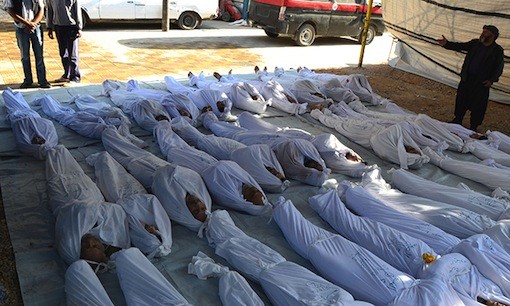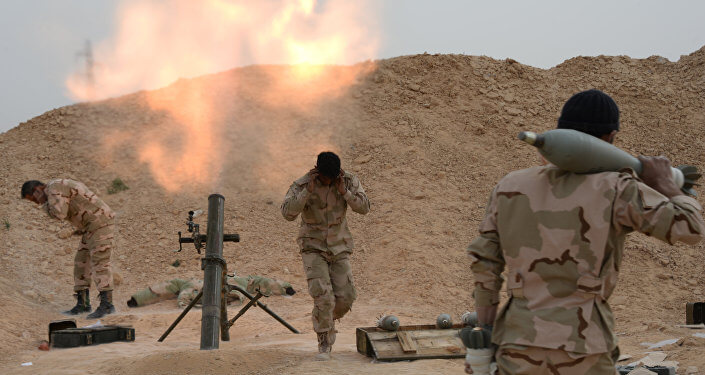By Alexander Mercouris
Admission by Die Welt that Western intelligence agencies had doubts in 2013 about claims of Syrian government responsibility for sarin gas attack on Damascus suburb was previously made by US President Obama himself.
The German newspaper Die Welt has recently created something of a stir by appearing to admit that the sarin gas chemical attack on the Damascus suburb of Ghouta in August 2013 may not have been carried out by the Syrian army as Western governments and the Western media have repeatedly claimed, but by the Syrian rebels instead.
The relevant paragraph in Die Welt’s article, as translated by the Moon of Alabama, reads as follows:
“When on August 21 2013 the nerve gas Sarin was used in Ghouta, a suburb of Damascus, [Obama] had to make a decision. He ordered to prepare an attack by sea-launched cruise missiles. But the British secret service was in possession of a sampling of the used Sarin. An analysis showed it not to be Sarin from the Syrian regime, but from the inventory of al-Nusra. Obama dropped his plan.”
As it happens, we have known for months that Western intelligence agencies at the time cast doubt that the Syrian government was indeed responsible for the sarin gas attack on Ghouta. Moreover we know it was doubts coming from the US intelligence agencies that caused Obama to call off his planned attack on Syria, which was being prepared in the aftermath of the sarin gas attack.
How do we know this? Because no less a person than Obama himself has told us.
Back in March the US magazine The Atlantic – one every bit as rigidly orthodox and Atlanticist as Die Welt – published a gigantic article based on a series of interviews its reporter Jeffrey Goldberg had had with Obama. In these obviously valedictory interviews Obama spelled out his foreign policy legacy, at least as he wants it remembered.
The issue of the aborted attack on Syria in August 2013 was discussed at exhaustive length in these interviews and is indeed in some respects the main subject of the whole article. Amidst Obama’s convoluted explanations for his decision to cancel his planned attack on Syria, buried deep inside the article, we find this quite remarkable paragraph, which in all the vast literature there has been about the Ghouta sarin attack has gone almost completely unnoticed.
“Obama was also unsettled by a surprise visit early in the week from James Clapper, his director of national intelligence, who interrupted the President’s Daily Brief, the threat report Obama receives each morning from Clapper’s analysts, to make clear that the intelligence on Syria’s use of sarin gas, while robust, was not a “slam dunk.” He chose the term carefully. Clapper, the chief of an intelligence community traumatized by its failures in the run-up to the Iraq War, was not going to overpromise, in the manner of the onetime CIA director George Tenet, who famously guaranteed George W. Bush a “slam dunk” in Iraq.”
(Bold italics added)
In other words there is no need to speculate that the planned US attack on Syria was called off because of doubts about Syrian government responsibility for the sarin gas attack within the Western intelligence community. The President of the United States no less has told us as much and has confirmed that those doubts existed, and that they formed an important part of the reason for his decision not to attack Syria in the days following the sarin attack.
In fact the doubts were so great that they caused no less a person than James Clapper, the director of US national intelligence, to come to the White House and interrupt the President’s daily intelligence briefing to warn him personally about them.
Here I will express my own view that it was James Clapper’s intervention which more than anything else decided Obama against launching his planned attack on Syria.
The fact the US was about to attack Syria had unleashed a political storm, with the Russian government making clear its strong opposition, the British parliament voting against supporting the attack, and widespread opposition to the attack within the US itself, with a likely vote against the attack in the US House of Representatives.
In this fraught atmosphere Clapper was clearly determined that no blame should be pinned on him and the US intelligence agencies if there was another Iraq style debacle. He therefore acted immediately and decisively to make Obama clearly aware of the doubts of Syrian government responsibility within the intelligence community by taking the extraordinary step of barging in on Obama’s daily intelligence briefing to tell him about them.
As for Obama, with his own director of national intelligence warning him so forcefully that there were doubts about the intelligence, there was simply no way of his taking on the huge political (and legal) risks of launching an attack. With public opinion hardening against the attack and the Republicans in Congress on the warpath, Clapper’s action left him far too personally exposed in the event of a debacle for him to have survived it politically.
What has clouded the issue is that Obama, as is his way, instead of simply and straightforwardly saying that he did not launch the attack because of doubts the Syrian government was responsible for the Ghouta sarin attack, has pretended that he took his decision for all sorts of complicated philosophical reasons, which appear at such length in the article in The Atlantic, which is based on his interviews.
The true reason the attack did not happen, and the doubts within the intelligence community about the Syrian government’s responsibility for the Ghouta sarin attack, are however there, in that paragraph in the article in the Atlantic.
It is baffling that this paragraph continues to attract so little attention. Not only has it gone almost completely unreported, with even the alternative media barely noticing it, but the Western media is simply ignoring it, continuing to write as if the Syrian government’s responsibility for the August 2013 sarin gas attack is a proved and established fact.
As for the point made by Die Welt about the low quality of the sarin used in the Ghouta sarin attack and the fact that this makes it unlikely that it originated in Syrian government stocks, that is in fact old news, discussed exhaustively in this outstanding but little known website, which has exhaustively and impartially reviewed all the publicly known evidence about the attack and concluded that the Syrian rebels almost certainly were responsible for it.











